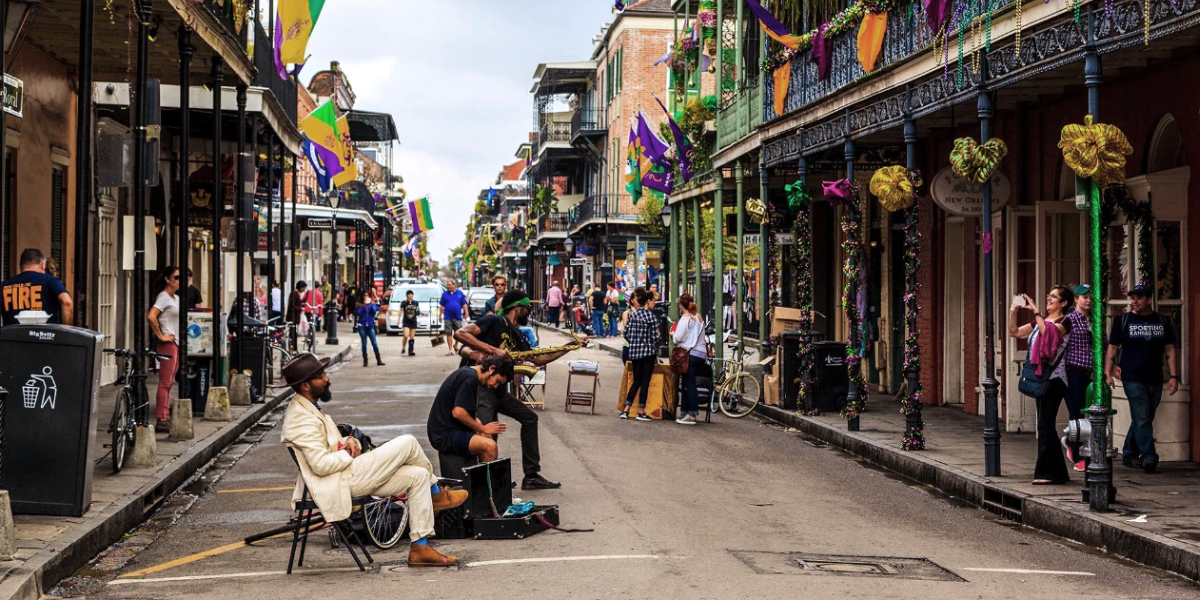93-year-old Bourbon Street conman wins again
In the old carnival game Razzle Dazzle, con artists reeled in unwitting victims through an unwinnable arcade gambling contest. On March 9, 2004, Louisiana’s State Police exposed a similar scam in New Orleans. In that case, emanating from a Bourbon Street T-shirt shop, losing bettors got duped a second time trying to report the confidence game to the New Orleans Police Department.
According to State Police investigators, New Orleans police officers set up to respond to pigeon complaints may have been in on the scam. As a result of the probe, NOPD confined four officers to desk duty Monday, March 8, 2004, for their alleged connection with the Happy Days souvenir shop at 335 Bourbon Street.
NOPD later reassigned these officers to another district.
The officers allegedly received $1,000 a week from the operator of the deception, Mitchell “Mitch” Schwartz, a 92-year-old flim-flam artist and career criminal with a rap sheet beginning with a 1930 bootlegging charge.
After Schwartz’s lifetime in and out of prison, a New Orleans judge gave him 40 years on a drug conviction. At 60 years old, that meant a life sentence for Schwartz. However, in 1984, Governor Edwin W. Edwards pardoned him.
Four years later, police arrested him in another drug bust at the same Bourbon Street address.
The take from Schwartz’s operation at the souvenir shop exceeded one million dollars a year, according to the State Police Gaming Division.
Authorities said that three of the officers allegedly on Schwartz’s payroll worked the 8th district, which included the French Quarter.
The State Police accused Charles Loescher, a 12-year veteran and the district’s crime prevention officer; Michael Eskine, an eight-year veteran and a hotel crimes detective; and Krister Vilan, a six-year veteran and a traffic officer and liaison with the district attorney’s office.
Not assigned patrols, investigators said, these officers could pretend to respond to aggrieved tourists and go through the motions of taking their reports.
Sergeant Samuel Poole, a 25-year veteran, assigned to community policing, also saw reassignment, although his connection to the “flat store” shop was not made unclear. Poole worked in the city’s public housing developments, placing him well outside the French Quarter.
Police spokesman Captain Marlon Defillo told Times-Picayune Staff Writer Michael Peristein that NOPD reassigned Poole due to “a separate, but parallel investigation of 335 Bourbon Street.” Poole became a target as an “offshoot” of the original probe, Defillo said.
On the day of Schwartz’s arrest in 2004, the investigation of potentially involved officers expanded to include the U.S. attorney’s office, FBI, and the Public Integrity Bureau. They held him in place of $69,000 in bail after booking him with theft, gambling, conspiracy, state racketeering, and possession with intent to distribute hydrocodone.
Inside the shop, state troopers found the drugs “in a compartment under two pieces of carpet behind a counter.” The pills, more than 350 of them, were stored in pill bottles with the labels torn off, a State Police report stated.
At the time of his arrest, police considered Schwartz one of the French Quarter’s most notorious old-time hoods. Several veteran officers alerted to the nonagenarian’s arrest were amazed to hear he was still alive and kicking.
“This guy is a legend,” one veteran officer said, “A professional, safe-cracking elite among criminals. I thought he was dead.”
In addition to alleged connections to organized crime figures, Mitchell’s voluminous police file included a 1942 sodomy conviction, a 1943 arrest under the white slavery tariff act, a 1946 conviction for possession of a Thompson submachine gun, a 1951 attempted burglary conviction, and a 1976 conviction on eight counts of possession with intent to distribute drugs stolen in pharmacy burglaries.
Rafael Goyeneche, president of the Metropolitan Crime Commission, told reporters, “You look up career criminal in the dictionary, and there’s his picture. We have complaints about this guy going back to the 1940s.”
At his 1976 drug conviction, the District Attorney expected Schwartz to get 180 years, but his attorney pleaded for mercy based on his advanced age. During that trial, then MCC president Aaron Kohn wrote Judge Frank Marullo arguing against the mercy plea, describing Schwartz as “a major figure in organized crime in New Orleans.”
“They’ve been using the old man excuse since he was 64 years old,” Goyeneche said in 2004. “You look at this guy and think he should be in a retirement home, but he’s supposedly pulling in a million dollars ripping people off. Amazing!”
In December 2004, a federal judge found Schwartz and co-defendant Terrence “Scotty” Border, 63, guilty of running the con game and paying off police officers. In a separate trial, the FBI described Border as “a career carny with 15 aliases.” Border served eight months in jail for his participation in the racket.
Investigators never charged the officers who participated in the scam.
In federal court, investigators explained, the two men ran a confidence game in the back of the souvenir shop. Their hustle fleeced tourists by luring them into a rigged betting game. The scam, they said, relied on slick-talking barkers to convince players that huge rewards were one bet away.
However, the big payoff never came.
The court scheduled Schwartz’s sentencing for Wednesday, April 13, 2005. Instead, however, the now 93-year-old mastermind swindled them one last time.
That morning just before nine, in the Ferncrest Manor Nursing Home in New Orleans East, Mitch Schwartz passed away.

